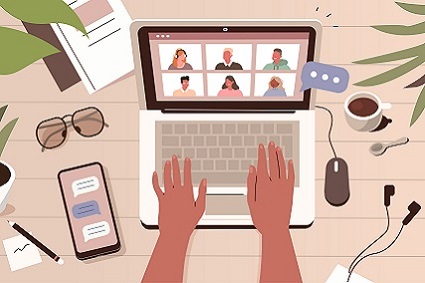
Fall 2021
Zooming through a Clinical Training Year: Reflections from a Virtual Clinical Health Psychology Intern
Danielle Wesolowicz, PhD✉; Pain SIG

Each year as a capstone for a doctoral degree in clinical psychology, graduate students apply and match to outside institutions to complete a full-time clinical internship. After four years of graduate school, I had a fairly concrete idea in my head of what an internship would look like: challenging but rewarding cases, intensive supervision, bonding with my fellow interns, and growing into a more confident clinician. Two weeks after match day, those expectations were flipped on their head with the onset of the COVID-19 pandemic. Watching my own graduate school department shift to virtual clinical care, I considered with dread “is this really what my internship year is going to look like?” With hope of returning to normal slowly fading as my internship start day approached, I was increasingly grappling with the idea of spending my internship year delivering clinical care from my room in a shared apartment in a new city where I knew almost no one.
From the beginning, I felt stuck helping my patients identify strategies to cope with social isolation. Normally, helping them identify community resources, volunteer opportunities, or new hobbies could be helpful in improving social connectedness; however, all of these activities were putting these individuals at risk for serious health conditions or even death. Feeling defeated, I often reflected “how can I help my patients cope with the isolation and uncertainty, when I’m struggling as well?” While I knew trying to keep connected with my cohort mates would theoretically be helpful in coping with my own sense of isolation, the thought of another hour spent on Zoom after a workday seemed unbearable. As the pandemic raged on and I watched the sun start to set at 4:00 p.m. at the beginning of a Northeast winter, I felt myself feeling increasingly drained and worried about my ability to grow as an effective clinician during this year.
As the year progressed, I increasingly began to recognize my own strengths in dealing with a less than ideal training year. Further, I found immense meaning in my ability to work with individuals who have been suffering with chronic pain for so long that driving to the main facility for in-person appointments would have been a major barrier to care. These little victories began to add up, and I increasingly felt more confident in myself. Reflecting back two months after my internship year ended, I am so in awe of the whole healthcare trainee community’s ability to roll with the punches and grow into effective clinicians in the context of a very dark and trying year. In my own experience, I struggled at points to feel fully able to appreciate and engage in my training year. However, I came out as a stronger clinician, maybe not in the ways I had imagined but through delivering good care despite health, social, and political uncertainties.
One of the most important lessons I learned throughout this experience was the idea that there is no one right way to cope. For individuals I work with, strategies like mindfulness, meditation, yoga, etc. are often my go-to recommendations for coping with stress. Sometimes, it felt as if there was an unspoken pressure to use these strategies myself to handle the stress of the training year. Speaking with supervisors and other trainees, I quickly realized others also experienced this pressure, and we humorously shared what we were actually doing to manage stress; cooking, taking on too many DIY projects, collecting houseplants, or sometimes having a good cry. In my own life, I found shutting off my laptop and immediately heading out for a walk after the workday was done was the best thing I could do for myself to mark a clearer end to the workday. While I sometimes felt guilty that I wasn't “practicing what I preached,” allowing myself to be vulnerable not only with myself but other trainees and supervisors allowed for the opportunity to better understand what I needed and how I could best cope with a challenging year.
Relevant resources and articles for coping as a healthcare trainee/provider:
- Adapting to COVID-19 as a Doctoral Student in the Health Sciences | SBM - Society of Behavioral Medicine
- Coping with COVID-19-related stress as a student (apa.org)
- Coping with Stress in the Time of COVID-19: Strategies to Enhance Resilience in Biomedical Graduate Students (asm.org)
- Self-care for the scientist (apa.org)
- Special report: Turmoil & transition (apa.org)
Thank you to the leadership of the Pain Special Interest group who contributed their insights and reflections in the drafting of this article. The goal of the Pain Special Interest Group is to advance the understanding of pain and its treatment, according to a biopsychosocial framework through interdisciplinary communication, promotion of pain-related research, education and training for researchers and clinicians, and mentorship.